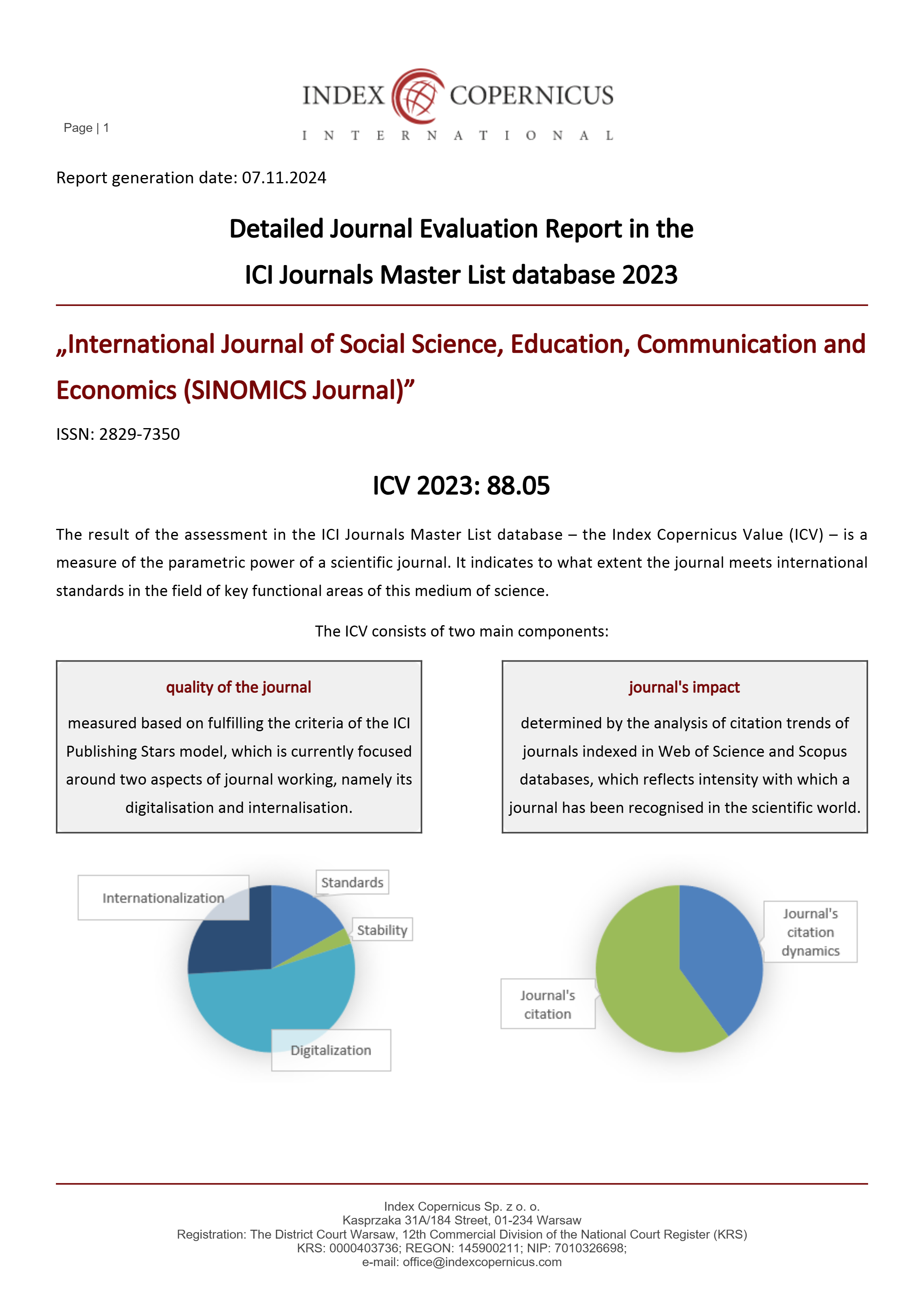The Relationship between Self-Compassion and Prosocial Behavior in Late Adolescents in DKI Jakarta
Main Article Content
Keisha Putri Amara
Amearah Bellarosa Yosza
Naomi Lamria Lisbet Naibaho
This study aims to determine the relationship between self-compassion and prosocial behavior in late adolescents in DKI Jakarta. The researcher employed a quantitative approach and utilized purposive sampling to select 400 subjects aged 18-21 years who lived in DKI Jakarta. Data were collected using the Prosocial Behavior Scale (PBS) and the Self-Compassion Scale (SCS). The data processing involved hypothesis testing through the Pearson correlation test. The results revealed a significant positive relationship between self-compassion and prosocial behavior, with a correlation coefficient of r = 0.107 and a p-value of 0.032, which is less than the significance level of 0.05. These findings suggest that higher levels of self-compassion are associated with greater prosocial behavior in late adolescents in this region. This research highlights the importance of fostering self-compassion as a potential means to enhance prosocial behavior among adolescents. Given the cultural context of DKI Jakarta, where communal values and social harmony are emphasized, self-compassion may play a crucial role in promoting positive social interactions and behaviors. Future studies could further explore the underlying mechanisms of this relationship and consider interventions to cultivate self-compassion in adolescents to support their social development and well-being.
Allen, A. B., & Leary, M. R. (2010). Self-Compassion , Stress , and Coping. Social and Personality Psychology Compass, 2(4), 107–118.
Caprara, G. V., Steca, P., Zelli, A., & Capanna, C. (2005). A new scale for measuring adults’ prosocialness. European Journal of Psychological Assessment, 21(2), 77–89. https://doi.org/10.1027/1015-5759.21.2.77
Chen, S., & Jordan, C. H. (2020). Incorporating ethics into brief mindfulness practice: effects on well-being and prosocial behavior. Mindfulness, 11(1), 18–29. https://doi.org/10.1007/s12671-018-0915-2
Crick, N. R., & Grotpeter, J. K. (1995). Relational aggression, gender, and social-psychological adjustment. Child Development, 66(3), 710–722. https://doi.org/doi:10.1111/j.1467-8624.1995.tb00900.x
Eisenberg, N, Carlo, G., Murphy, B., & Court, P. Van. (1995). Prosocial development in late adolescence. Child Development, 66(4), 1179–1197.
Eisenberg, Nancy, & Mussen, P. H. (1989). The Roots of Prosocial Behavior in Children. Cambridge University Press.
Goleman, D. (2003). Destructive emotions: How can we overcome them? Bantam Books.
Greener, S. H. (2000). Peer assessment of children’s prosocial behaviour. Journal of Moral Education, 29(1), 37–41. https://doi.org/10.1080/030572400102925
Hurlock, E. B. (2003). Suatu Pendekatan Sepanjang Rentang Kehidupan. Psikologi Perkembangan.
Kau, M. A. (2010). Empati dan perilaku prososial pada anak. Jurnal Inovasi, 7(3), 1–5. https://journal.ugm.ac.id/jpsi/article/view/7027
Marshall, S. L., Ciarrochi, J., Parker, P. D., & Sahdra, B. K. (2020). Is self-compassion selfish? The development of self-compassion, empathy, and prosocial behavior in adolescence. Journal of Research on Adolescence, 30(S2), 472–484. https://doi.org/10.1111/jora.12492
Megawati, E., & Herdiyanto, Y. K. (2016). Hubungan antara perilaku prososial dengan psychological well-being pada remaja. Jurnal Psikologi Udayana, 3(1), 132–141. https://doi.org/10.24843/jpu.2016.v03.i01.p13
Neff, K. D. (2003a). Self-compassion: an alternative conceptualization of a healthy attitude toward oneself. Self and Identity, 2(2), 85–101. https://doi.org/10.1080/15298860309032
Neff, K. D. (2003b). The development and validation of a scale to measure self-compassion. Self and Identity, 2, 223–250. https://doi.org/10.1080/15298860390209035
Neff, K. D., & Pommier, E. (2012). The Relationship between self-compassion and other-focused concern among college undergraduates, community adults, and practicing meditators. Self and Identity, 12(2), 160–176. https://doi.org/10.1080/15298868.2011.649546
Rahajeng, U. W., & Wigati, T. Y. A. (2018). Perilaku Prososial Sebagai Prediktor Status Teman Sebaya Pada Remaja. Jurnal Psikologi Teori Dan Terapan, 8(2), 124–132. https://doi.org/10.26740/jptt.v8n2.p124-132
Savitri, D. C. H. (2014). Perbedaan perilaku prososial remaja etnis Jawa SMA di desa dengan di kota. Universitas Katolik Soegijapranata.
Setio, B. E. (2016). Pengaruh kecerdasan emosi dan kepribadian terhadap perilaku prososial pengguna transportasi umum. Universitas Islam Negeri Syarif Hidayatullah.
Situmorang, F. M. (2014). Busway dalam renungan. Memaknai Dunia. https://fransmateusbah.wordpress.com/2014/01/06/busway-dalam-renungan/
Staub, E. (1979). Positive Social Behavior and Morality. In Positive Social Behavior and Morality (Vol. 2). Academic Press. https://doi.org/10.1016/c2013-0-11529-2
Steffen, P. R., & Masters, K. S. (2005). Does compassion mediate the intrinsic religion-health relationship? Annals of Behavioral Medicine, 30(3), 217–224. https://doi.org/10.1207/s15324796abm3003_6
Sugiyono. (2015). Metode penelitian kuantitatif, kualitatif, dan R&D. Alfabeta.
Suryaratri, R. D. (2015). Statistika deskriptif untuk psikologi dan pendidikan.
Susilaningsih, C. Y. (2015). pengembangan model bimbingan kelompok berbantuan film edukasi untuk meningkatkan empati siswa SMA. Widya Warta, 1, 13–24.
Welp, L. R., & Brown, C. M. (2014). Self-compassion, empathy, and helping intentions. Journal of Positive Psychology, 9(1), 54–65. https://doi.org/10.1080/17439760.2013.831465
Wiguna, M. C., & Theresia, E. (2020). Hubungan antara self-compassion dan compassion for others pada guru SD ‘X’ di Kota Bandung. Humanitas (Jurnal Psikologi), 4(2), 117–130. https://doi.org/10.28932/humanitas.v4i2.2703
Yang, Y., Guo, Z., Kou, Y., & Liu, B. (2019). Linking self-compassion and prosocial behavior in adolescents: the mediating roles of relatedness and trust. Child Indicators Research, 12(6), 2035–2049. https://doi.org/10.1007/s12187-019-9623-2
Zahra, S. A. (2014). Pengaruh kematangan emosi dan pola asuh orang tua terhadap altruisme pada mahasiswa UIN Syarif Hidayatullah Jakarta. Universitas Islam Negeri Syarif Hidayatullah.










